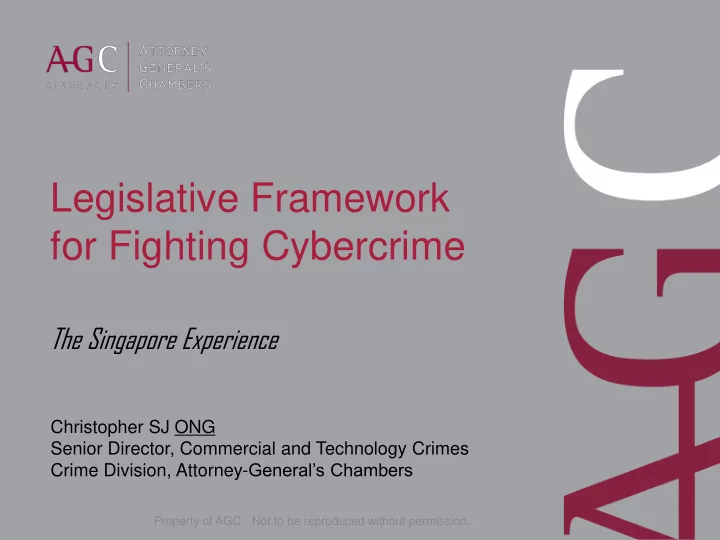

Legislative Framework for Fighting Cybercrime The Singapore Experience Christopher SJ ONG Senior Director, Commercial and Technology Crimes Crime Division, Attorney- General’s Chambers Property of AGC - Not to be reproduced without permission.
Introduction • What is Cybercrime? – Computer integrity crimes – Computer-facilitated crimes – Content crimes Property of AGC - Not to be reproduced without permission.
Property of AGC - Not to be reproduced without permission.
What is Cybercrime? • Increasingly, the challenge is computer-facilitated crimes – ”Old wine in new bottles” – Every crime = cybercrime? • Legislative framework must be: – Holistic – Regularly reviewed and updated • Also need to address operational challenges Property of AGC - Not to be reproduced without permission.
Legislative responses – Cybercrime-specific legislation – Updated Traditional Criminal Law – Procedural Legislation • Investigative Powers • Admissibility of Evidence Property of AGC - Not to be reproduced without permission.
Cybercrime-specific legislation • Computer Misuse Act • Computer-integrity crimes • Updated in 2017 to introduce new crimes: • Possession etc. of personal information • Possession etc. of hacking tools • Remote Gambling Act • Online gambling • Protection from Online Falsehoods and Manipulation Bill • Anti-fake news law Property of AGC - Not to be reproduced without permission.
Updated traditional legislation • Penal Code • Updated in 2007 to include electronic forms of certain traditional crimes • Updated most recently in 2018 • Updated more traditional crimes • Cheating etc. of automated systems • New offences, including “no outcome” fraud and possession of personal information • Updating and introducing new definitions • Protection from Harassment Act • Online harassment • Stalking (including cyberstalking) • Civil remedies Property of AGC - Not to be reproduced without permission.
Police Investigative Powers • Amendments to Criminal Procedure Code in 2018, to ensure that law enforcement is empowered to access evidence on computers regardless of whether the evidence is stored on a computer inside or outside Singapore. • Section 39 CPC - Power to access computer – A police officer may – Access a computer (whether in Singapore or elsewhere) – That is reasonably suspected of : • being used in connection with an offence; or • containing evidence relating to the offence. • Power extends to searching any data contained in / available to such computers; and to make a copy of any such data. Property of AGC - Not to be reproduced without permission.
Police Investigative Powers • Investigators may conduct remote search if the computer is known to be outside Singapore or if its whereabouts are unknown, where – the owner of that computer consents to the search; – the owner of that data consents to the search; – the access is obtained through an active connection with another computer, which has been lawfully seized; – the access is obtained through any username, password or other authentication information stored in another computer, which has been lawfully seized; or – the access is obtained through any username, password or other authentication information provided in any statement made by any person during investigations.
Police Investigative Powers Investigators are also empowered to order a person to provide login credentials to a • computer or a cloud services account. The investigator may order any of the following persons to provide the necessary • assistance: – any person whom the police officer reasonably suspects of having used the computer in connection with the offence; – any person concerned with the operation of the computer; – any person whom the police officer reasonably believes has knowledge of any login credentials to the computer. The types of assistance that can be sought? • – assistance to gain access to the computer (including assistance through the provision of any username, password or other authentication information required to gain access to the computer)
Admissibility of Evidence • Pre-2012 Law reflected (archaic?) perception that electronic evidence was (inherently) prone to fabrication / tampering. Parties admitting electronic evidence had to establish reliability of the computer system that produced/stored the evidence, before it could be admitted. • 2012 amendments Evidence Act was amended and additional pre-requisites to admitting electronic evidence were repealed. Electronic evidence is now treated the same way as any other form of evidence. Threshold of admissibility = relevance. Like any other evidence, adverse party can challenge admissibility / reliability Property of AGC - Not to be reproduced without permission.
Conclusion Property of AGC - Not to be reproduced without permission.
Recommend
More recommend